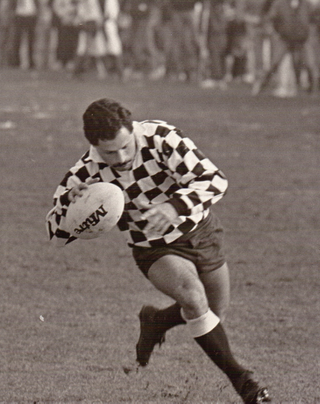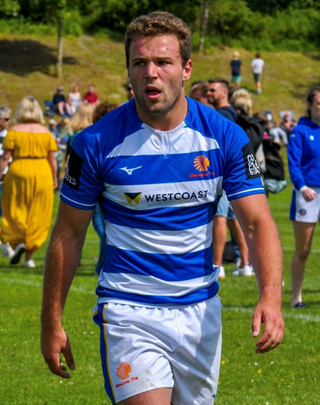Passing the medical torch: From past tackles to future tries
By Nigel and Fin Rossiter
Nigel

It is almost exactly 40 years since I started in this ‘game’, and I will very soon be hanging up my scalpel. I cannot really recall my first days at medical school as it was a blur of beer and Fresher’s Week – though I am sure we all remember that first day in the dissection room. I do vividly remember my anatomy demonstrators, looking at how hard they were working for their Primary FRCS exam and thinking that was a mug’s game that I would not attempt to emulate. I had already arranged with a friend’s father that I would become a GP, get trained in the Army and on leaving take over his practice in Salcombe. If only I had enjoyed general practice. Medicine was far too cerebral, non-surgical specialities did not attract me, general surgery too smelly and most of my rugby friends seemed to go into Orthopaedics, plus I was really drawn towards Trauma – much with the Army’s encouragement - and so it was there I went.
I was certainly influenced by the Consultants I saw at all stages. I recall at medical school dreaming of seeing the end of two awful conditions: rheumatoid arthritis and pre-menopausal breast cancer. When I started in Orthopaedics, 1 in 4 joint replacements was for rheumatoid arthritis; it is now around 1 in 50 – the advent of disease-modifying antirheumatic drugs (DMARDs) has revolutionised the outlook for people with inflammatory arthropathies. While the outlook for pre-menopausal breast cancer is much better, I’m not sure we are there yet. The firm system was very much in existence and was wonderful – I/we really miss it and grieve over its systematic demise. However, we also learnt very much by our mistakes – hip fractures done only after midnight with no supervision, the inability to get a registrar post unless you had at least 50 DHS and 50 hip hemiarthroplasties already under your belt – whether they were disasters or not. It was also a very exciting time in terms of Trauma development – my career has virtually mirrored the understanding of Trauma physiology and I have worked through traction, early total care, damage control surgery, to early appropriate care.
Gone, hopefully, are the days of unsupervised operating through the night on polytrauma victims, drowning them in salty water and filling their bodies with the contents of the Ruhr valley, filling every hole in a plate and maximally invasive osteosynthesis. The days of the standard 1 in 2, or 1 in 3 with internal cover, on a surgical rotation working 90+ hours a week are gone – correctly. But do our trainees today have enough time to get proficient surgically and even more importantly, with decision-making before becoming Consultants? Hopefully, also going are the days of: ‘see one, don’t question it, do it, teach it’. What I have spent a career teaching my trainees almost didn’t exist until I reached Oxford – that you should question everything we do, look for the evidence and if there isn’t any: do something about it. The practice of evidence-based care certainly was virtually non-existent 40 years ago and unfortunately, is still not fully endorsed or practiced today. It should be.
The multidisciplinary teams, BOASTs and now SPECs are a giant step forward, and we should all be doing this standard of care for all our patients. Patient involvement in care, decisions and research was also non-existent and is a correct standard now. Forty years ago, Trauma was a real Cinderella. It still is somewhat, but is so much better in England than it was. The institution of the Trauma Networks in England in 2010 and 2012 was the culmination of over 15 years hard work which was far from popular – but I don’t think any of us would change now.
Few other places can say that your chance of surviving major Trauma today is 20% greater than it was 10 years ago and costs the country less. Just 10 years ago, Britain was a bystander on the global stage as far as Orthopaedic Trauma research was concerned. The development of the Orthopaedic Trauma Society has taken us from bystander status to global lead – and Orthopaedic Trauma now is the major player for funding for research from NIHR. (Orthopaedic) Trauma however remains the single largest unaddressed global healthcare issue – more people die and are injured from Trauma than from all contagious diseases added together, including COVID-19, annually. Finally, the NHS is always in crisis, but the present is not good – not helped by the BMA, and things must change. The NHS is a vote loser and therefore no one has the courage to make the necessary difficult decisions. I personally feel it should become a crossbench/Royal Commission where all parties have a stake so that collective responsibility will allow the necessary difficult decisions to be made for the survival and future of the NHS. Let us hope that 40 years from now, things have changed, the NHS still exists, that Trauma is better prioritised globally and my son has not burnt out like me.
Fin

In slight contrast to my Dad, it is almost exactly three years since I started in this ‘game’ and I am somewhat far off from hanging up any scalpels (or perhaps a stethoscope). My first experience of healthcare and the NHS was my work experience, which could be better phrased as my father’s serious attempt to put me off the profession. Unbeknownst to me at the time, Dad knew the physicians that I was due to be under very well – something that I have become increasingly used to on my placements – and he had asked them to show me the slightly less glamorous things. This would explain why at 16 years old, having had very little in the way of introduction or ‘easing in’, I found myself at the colonoscopy of an 81-year-old woman suspected of having colon cancer.
After this, as well as many other similar experiences, I emerged from the hospital at the end of the week and excitedly confirmed to my Dad that in two years’ time I would be submitting my application to medical school. He did a very good job hiding the fact that his plan had failed. The two of us attending the same medical school was a choice made by me and not him. However, I like to think that my winning of the United Hospitals’ Rugby Cup in 2022, as he had done in 1986 wearing the same colours, made up for the failure of his plan. While the two of us share the first days being a blur of beer and Fresher’s Week – although mine was confined to the halls of residence due to a global pandemic – we differ on our outlook of post-medical school life.
I arrived at medical school with a thought I might like to go into Trauma and Orthopaedics, perhaps due to being my father’s son, but also perhaps because I spent much of my rugby career in the department at various hospitals. However, I was soon fascinated by the cerebral nature of medicine, that Dad has referred to, and also to date have seen little of the surgical specialities – aside from a brief general surgery rotation and anatomical dissection. In contrast, my first year in clinical medicine has been spent almost entirely on general medical wards, which is something that I have greatly enjoyed. This has left me in a somewhat blissful no man’s land of having absolutely no clue of what my future career will hold, allowing me to go after any opportunity that presents and not ‘pigeonhole’ myself.
While this is something that might change once I spend more time on surgical specialties and other medical specialities in my fourth year of medicine, I intend to enjoy it while it lasts. So much so, that I will be prolonging it by undertaking an intercalated degree at King’s College London next year. This is something that in the last 10 or 20 years was almost a given that people did, differing from it being a rarity when Dad attended medical school. However, the rarity of intercalation has started to return, as it is discounted from the foundation application and requires another year of student loans. My decision to do one is driven by the desire to achieve a BSc, be involved in research and improve my theoretical knowledge. However, I have to say there is also an added benefit of giving me a year to be Chairman of the medical school rugby club, as well as delaying entering the ‘real world’ by just a little longer.
While I recognise entering this world and starting my NHS journey is inevitable, it is hard to ignore my friends who have recently graduated, speaking to me about being tired and understaffed, as well as being involved in strikes. Seeing this and speaking to them makes me understand the reality of working in the NHS, and this may be in the back of my mind when I speak about taking an extra year before starting. Interestingly, having seen and heard all of this, I am not deterred from finishing medical school and entering the NHS as an FY1. I also have every intention of remaining practicing in the UK and remaining in the NHS. I do of course recognise this is the view of a completely naïve medical student who has not worked a day as a doctor in the NHS. However, I also believe – having spoken to my friends that have qualified – that many also have that intention. They simply also have a desire for reform and this can be a deal breaker. I imagine once I have qualified that I will share that desire if the need for it remains, but I truly hope to spend my working life giving back to the NHS, after all that it has given to me.
